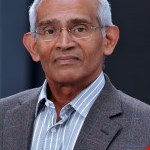
Professor Wamadeva Balachandran - Professor Balachandran is Professor of Electronic Systems and served as Head of Department of Systems Engineering at Brunel University London, UK, from 1999 to 2004. Before joining Brunel University London in 1995, he was a Reader in the Department of Electronics & Electrical Engineering at the University of Surrey, UK. Prior to joining Surrey he was a Post-Doctoral Research Fellow in the Department of Electronics at Southampton University, UK, from 1979 to 1983. He received his MSc and PhD degrees in Control Engineering and Measurement & Instrumentation from University of Bradford, UK, in 1975 and 1979 respectively. He received the BSc degree in Physical Sciences from University of Ceylon, Colombo, Sri Lanka, in 1971. After serving as a temporary member of academic staff for nine months in University of Ceylon, Colombo, Sri Lanka, he joined as an academic member of staff in the Physics Department of Fourabay College, University of Sierra Leone in 1971 and remained until 1974. During this period he also taught Physics and mathematics in a secondary school. He was a Visiting Professor in the Driftmier Engineering Centre at University of Georgia in 1993 and 1996. He is a Visiting Professor at the University of Mansoura and Dongguan University in China. In 2004 he was a Visiting Scholar in the School of Engineering & Applied Science at University of California, Los Angeles. Professor Balachandran is a Fellow of IEEE (USA), IEE (UK), InstPhy (UK), InstMC (UK) and Royal Society of Arts (UK). His research interest spans several different disciplines: Electrostatics & Charge Particle Dynamics, Electrohydrodynamics, Micro/Nano particles and fibre generation, Transport of DNA using DEP force, Lab-on-a-chip, Electromagnetic Field Sensing, EM Interaction with Human Body, Dynamic Measurement Systems, Global Positioning Satellite System for Navigation and Medical Electronics. He has actively pursued research in these fields for more than 20 years and published over 200 papers to date and filed 10 patent applications. He has served as an External Examiner for 23 PhD degrees in the UK, France and Australia. Professor Balachandran has presented more than 40 plenary and invited talks in his field of expertise at international conferences around the globe. He has organized and Chaired several international conferences and continue to serve as a member of several scientific and organizing committees of international conferences. He is regularly invited to Chair sessions at IEEE/IAS, ICLASS, and several other meetings in the UK, Europe, USA and Asia. On a couple of occasions, Prof. Balachandran’s research has been featured on BBC World Service and TV Broadcasts. He continues to review manuscripts for 15 archival journals and research grant applications for EPSRC (UK), EU Framework, NSF (USA), SERC (Canada) and Singapore government. Prof. Balachandran is a member of the Editorial Board of the Journal of Atomization and Sprays, and the International Journal of Particle Science and Technology. He is a paper review manager of IEEE Transactions of Industrial Application Society. He has been a Guest Editor for the Journal of Measurement & Control. He has served as a member of Brunel University London Court, Council, Senate, Finance Committee, Appeals Panel, Faculty Board and Wolfson Centre Advisory Board. He has a long experience of acting as a consultant in the fields of his research to over 30 companies worldwide.